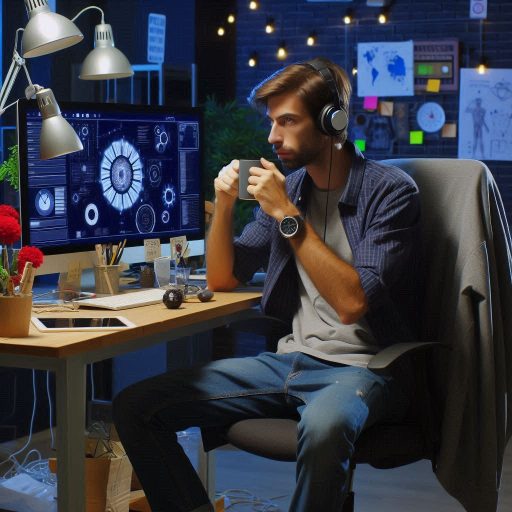Introduction
The gaming industry has grown tremendously over the past few decades, becoming a major entertainment medium.
From early arcade games to modern, complex virtual worlds, the industry has evolved in both technology and creativity.
Video games are no longer just a form of entertainment; they are cultural phenomena, influencing art, storytelling, and even education.
This growth has created a high demand for skilled professionals who can craft these immersive experiences, particularly game designers and game developers.
Understanding the difference between these two roles is essential for anyone looking to enter the gaming industry.
Brief Overview of the Gaming Industry
The global gaming industry is one of the largest and most lucrative entertainment sectors in the world.
With billions of players across various platforms, from consoles to mobile devices, the gaming landscape is vast and diverse.
Advances in technology have allowed developers to create more intricate and engaging gaming experiences.
This progress has led to the creation of jobs that focus on both the technical and creative aspects of game development.
The industry‘s need for innovative ideas and cutting-edge technology has pushed the boundaries of what games can achieve, transforming the way people interact with virtual environments.
Importance of Game Designers and Game Developers
Game designers and game developers play critical roles in bringing a video game to life.
Game designers focus on the creative aspects, such as the storyline, characters, and gameplay mechanics.
They envision how the game will look and feel, ensuring it engages players from start to finish.
On the other hand, game developers are responsible for the technical side, using programming languages and software to build the game‘s functionality.
While designers create the vision, developers turn that vision into a playable reality.
Both roles are vital, and their collaboration determines a game‘s success.
Without designers and developers working together, the gaming industry would not be where it is today.
Role of a Game Designer
Definition of a Game Designer
A game designer is a professional responsible for conceptualizing the core elements of a video game.
They outline the game‘s mechanics, plot, characters, and overall structure.
Game designers create the foundation upon which the entire game is built.
They transform ideas into detailed plans that development teams can follow to bring a game to life.
In essence, the game designer acts as the architect of the game world, ensuring that every feature works cohesively to create an engaging experience for players.
Responsibilities of a Game Designer
A game designer wears many hats during the development process.
Their primary responsibility is to design the gameplay mechanics, rules, and objectives that make the game enjoyable and challenging.
They work closely with artists, developers, and producers to ensure the game‘s vision is achieved.
Game designers must also conduct market research to understand what players want and ensure their designs meet those expectations.
Additionally, they play a role in testing and tweaking gameplay to enhance the player‘s experience and balance the game‘s difficulty.
Skills Required for Game Designing
Game designing requires a unique blend of creativity and technical knowledge.
Designers must possess excellent communication skills to effectively collaborate with teams across various disciplines.
Problem-solving skills are crucial, as designers often face challenges in gameplay mechanics that need innovative solutions.
A strong understanding of programming languages and game engines is also essential, as this helps designers create practical designs that can be easily implemented.
In addition, game designers must stay current on gaming trends and player preferences to create engaging and relevant content.
Importance of Creativity in Game Designing
Creativity is at the heart of game design.
Game designers must constantly come up with original concepts that captivate players and stand out in a competitive market.
Creativity helps designers think outside the box and develop unique gameplay mechanics, intriguing storylines, and immersive worlds.
Without creativity, games would lack the innovation needed to keep players engaged and invested in the experience.
A game designer‘s ability to combine technical knowledge with creative vision is what sets apart successful games from the rest.
Read: Freelance vs. In-House Costume Design Jobs
Role of a Game Developer
Definition of a Game Developer
A game developer is responsible for turning game ideas into interactive experiences.
They focus on programming and coding the game mechanics.
Unlike game designers who conceptualize the game, developers execute those concepts into a functional product.
Game developers work closely with designers, artists, and sound engineers to ensure that the game operates as intended.
Their primary goal is to transform creative visions into playable games that users can enjoy.
Without game developers, game ideas would remain just concepts, never reaching the hands of players.
Responsibilities of a Game Developer
The responsibilities of a game developer include writing code to implement the game‘s features, fixing bugs, and optimizing performance.
They ensure that the game runs smoothly across different platforms, whether it’s on a console, PC, or mobile device.
Developers also collaborate with designers to integrate game elements like animations, sound effects, and user interfaces.
Their work extends beyond coding, as they are often involved in testing, debugging, and refining the game.
Meeting deadlines and coordinating with other teams are essential aspects of their job.
They must also be adaptable to changes in project scope and design updates.
Skills Required for Game Development
Game developers need strong problem-solving skills, as coding a game often involves overcoming complex challenges.
Proficiency in programming languages such as C++, Python, or JavaScript is essential for creating game logic, rendering graphics, and handling player inputs.
Additionally, knowledge of game engines like Unity or Unreal is crucial for streamlining development.
Time management skills are important for meeting project deadlines.
Developers also need excellent teamwork skills, as they regularly work with designers, artists, and testers to deliver a polished product.
A good game developer continuously updates their skills to keep pace with technological advancements in the gaming industry.
Importance of Technical Knowledge in Game Development
Technical knowledge is critical in game development, as it ensures that a game functions properly and performs well.
Developers need to understand how hardware and software interact to optimize a game‘s performance.
A deep understanding of algorithms and data structures helps them make the game more efficient.
Moreover, knowledge of networking is vital for developers working on multiplayer games.
Technical expertise allows developers to troubleshoot issues and prevent bugs that could negatively impact the gaming experience.
Without strong technical knowledge, creating a high-quality, functional game would be impossible.
In fact, game developers play a vital role in bringing game designs to life through coding and problem-solving.
Their technical skills and responsibilities are essential in ensuring that the game operates as intended.
Read: Networking Events for Costume Designers
Key Differences in Job Titles
When it comes to the gaming industry, there are distinct roles that play a crucial part in bringing a game to life.
Game designers and game developers are two key positions that work in tandem to create captivating gaming experiences.
Let’s delve into the differences between these job titles:
Clarification of the Distinctions Between Game Designer and Game Developer
Game designers are responsible for conceptualizing the gameplay, storyline, characters, and overall gaming experience.
They focus on the creative aspects of game development, crafting ideas that engage and excite players.
Designers brainstorm game mechanics, levels, and challenges to ensure a cohesive and immersive gaming experience.
On the other hand, game developers are the technical wizards behind the scenes.
They bring the game designer’s vision to life by coding, programming, and implementing the game elements.
Developers work on the intricate details of the game, such as graphics, sound, and user interface, to create a seamless and functional gaming environment.
The Creative Aspect in Game Designing
Game designers are essentially storytellers who use creativity and innovation to shape the player’s journey through the game.
They design characters with unique personalities, craft compelling narratives, and create immersive worlds that draw players in.
Designers prioritize player experience, ensuring that every aspect of the game enhances engagement and enjoyment.
Furthermore, game designers collaborate closely with artists, writers, and creative directors to bring their vision to life.
They provide guidance and feedback to ensure that the game’s visuals, audio, and narrative align with the overall design goals.
Designers use their artistic talents and storytelling skills to create memorable and impactful gaming experiences.
The Technical Aspect in Game Development
Game developers are the unsung heroes who turn design concepts into functional, interactive games.
They possess strong technical skills in programming languages, game engines, and software development tools.
Developers work tirelessly to optimize game performance, fix bugs, and ensure that the game runs smoothly on various platforms.
Moreover, game developers are proficient in coding languages such as C++, Java, and Python, which are essential for building game functionalities.
They collaborate with designers to translate creative ideas into technical specifications, ensuring that the game’s features are implemented efficiently and effectively.
Developers continually update and maintain the game code to improve performance and address any technical issues that may arise.
In a nutshell, while game designers focus on the creative vision and player experience, game developers bring that vision to life through technical expertise and programming skills.
Both roles are essential in the game development process, working together to create innovative and engaging games that captivate audiences worldwide.
Read: Building a Portfolio for Costume Design

Collaborative Efforts
How game designers and game developers work together
Game designers and developers collaborate closely to bring a game concept to life.
Designers craft the core ideas, defining gameplay mechanics, narrative elements, and player experiences.
Developers, on the other hand, transform these creative visions into functional games using code, technology, and programming tools.
This partnership is essential to ensure that the game‘s artistic vision aligns with its technical performance.
Both roles require mutual understanding and respect for each other’s expertise.
Without collaboration, a game could fail to reach its full potential, as both creativity and technical skills are necessary to achieve success.
Importance of communication between the two roles
Effective communication is vital between game designers and developers to ensure a smooth workflow.
Designers must clearly explain their ideas and provide detailed documentation, while developers need to interpret these ideas into practical implementations.
Miscommunication can lead to delays, misunderstandings, and costly errors.
Regular meetings, feedback loops, and collaborative tools help maintain alignment throughout the game’s development process.
The importance of communication cannot be overstated because it ensures that both the creative and technical aspects of the game move forward in harmony.
A well-coordinated team ultimately produces a higher quality product.
Transform Your Career Today
Unlock a personalized career strategy that drives real results. Get tailored advice and a roadmap designed just for you.
Start NowExamples of successful collaborations in popular games
Many popular games owe their success to the strong collaboration between designers and developers.
For instance, the collaboration in the development of The Legend of Zelda, Breath of the Wild highlights how innovative design and programming can work together.
The game’s vast open world, intricate puzzles, and seamless gameplay were only possible through close teamwork.
Another example is The Witcher 3, Wild Hunt, where designers and developers worked hand-in-hand to deliver an immersive, narrative-driven experience with top-notch technical execution.
These successful partnerships show how crucial collaboration is in creating games that are both engaging and technically sound.
Read: Famous Costume Designers in Hollywood
Uncover the Details: Career Paths for Web Designers in 2024
Career Paths
Opportunities for Advancement in Game Designing
Game designers have numerous opportunities for advancement.
Early in their career, they may start as junior designers, working on smaller aspects of game creation.
With experience, they can move up to senior designer roles where they oversee larger sections of the game.
Experienced designers often transition into lead roles, managing entire design teams.
As they progress, some designers may become creative directors, responsible for the overall vision of a game.
The path for advancement depends on their creativity, problem-solving skills, and ability to deliver engaging experiences to players.
Opportunities for Advancement in Game Development
Game developers also have distinct advancement opportunities within the industry.
Developers typically begin as junior programmers, focusing on specific game elements, such as coding character movements or physics.
With time and experience, developers may take on more complex coding tasks, eventually becoming senior developers.
Senior developers often mentor junior staff and handle more significant projects.
As they advance, some may transition into lead developer or technical director roles, overseeing the programming of entire games.
The advancement depends heavily on their technical expertise and proficiency in various programming languages.
Variations in Salary and Job Prospects Between the Two Roles
While both game designers and developers enjoy good job prospects, their salaries and opportunities can vary.
Game developers often earn higher salaries due to the technical nature of their work.
Developers with specialized skills in areas such as artificial intelligence or virtual reality are especially in demand.
On the other hand, game designers, although well-compensated, may have slightly lower average salaries.
However, designers with a unique creative vision or expertise in user experience can also command competitive pay.
Job prospects for both roles remain strong, with demand growing as the gaming industry expands.
Developers and designers who stay current with industry trends and new technologies are well-positioned for continued success.
Impact on the Gaming Industry
Influence of game designers on game innovation
Game designers play a crucial role in shaping the gaming industry by coming up with creative ideas and innovative game mechanics.
They are responsible for creating unique and engaging gameplay experiences that captivate players and keep them coming back for more.
By pushing the boundaries of traditional game design, designers have the opportunity to revolutionize the industry and set new standards for what a successful game looks like.
Their ability to think outside the box and experiment with different concepts can lead to groundbreaking innovations that change the way we play and experience games.
Influence of game developers on technical advancements
On the other hand, game developers are instrumental in driving technical advancements within the gaming industry.
They are responsible for turning the creative vision of game designers into reality by coding, programming, and implementing the various elements that make up a video game.
Developers work tirelessly to optimize performance, improve graphics, and incorporate cutting-edge technologies to enhance the overall gaming experience.
Their expertise in programming languages, game engines, and software development tools is essential for creating games that are both visually stunning and technically impressive.
How the collaboration between game designers and game developers shapes the industry
The collaboration between game designers and game developers is essential for the success of any game and ultimately shapes the industry as a whole.
By working together, designers and developers can leverage their respective skills and expertise to create games that are not only fun to play but also technically sound.
Designers bring their creative vision and gameplay ideas to the table, while developers implement these ideas and ensure that they function smoothly within the game.
This collaborative process results in a seamless integration of design and technology, leading to games that are well-crafted, innovative, and enjoyable for players of all ages.
Overall, the partnership between game designers and game developers is what drives the gaming industry forward and pushes the boundaries of what is possible in the world of video games.
Their combined efforts result in games that are not only entertaining but also groundbreaking in terms of design, technology, and overall player experience.
Conclusion
The key differences between a game designer and a game developer lie in their roles and responsibilities within the gaming industry.
A game designer is primarily responsible for conceptualizing gameplay, storylines, and mechanics, focusing on the creative aspect of game development.
On the other hand, a game developer is more technical, translating the game designer’s vision into a functional game by writing code and building the game environment.
It is important to acknowledge that both roles are crucial in the gaming industry.
Game designers and developers work hand in hand to bring a game to life, combining their expertise to create immersive and engaging experiences for players.
Without the collaboration between these two roles, games would not be able to reach their full potential.
For aspiring game designers and game developers, it is essential to pursue their passion and hone their skills in their respective fields.
By understanding the key differences between game design and game development, individuals can make informed decisions about their career paths and work towards becoming successful professionals in the gaming industry.
Whether you are interested in crafting unique game experiences as a designer or working on the technical aspects of game development as a developer, there is a place for you in the ever-evolving world of gaming.
Embrace your creativity, strive for excellence, and never stop learning.
The future of gaming is in your hands.
[E-Books for Sale]
The Big Book of 500 High-Paying Jobs in America: Unlock Your Earning Potential
$19.99 • 500 High-Paying Jobs • 330 pages
Explore 500 high-paying jobs in America and learn how to boost your career, earn more, and achieve success!
See All 500 High-Paying Jobs of this E-Book
1001 Professions Without a Degree: High-Paying American Jobs You Can Start Now
$19.99 • 1001 Professions Without a Degree • 174 pages
Discover 1001 high-paying jobs without a degree! Unlock career tips, skills, and success strategies for just $19.99!




